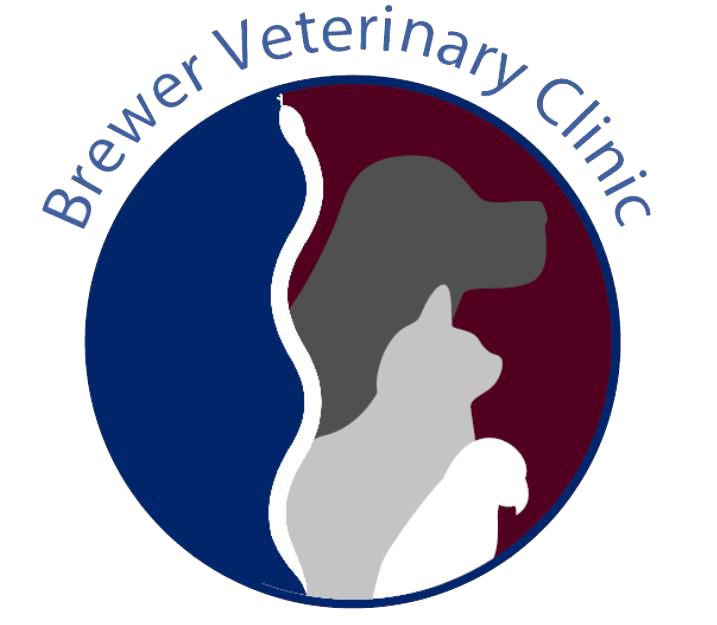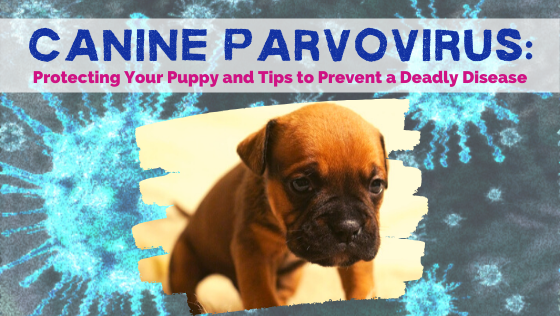Within the past few weeks, we’ve seen several puppies from different litters obtained in this area who tested positive for parvovirus, or parvo for short. Parvo is an incredibly contagious illness that can be passed from dog to dog through direct or indirect contact with feces or fecal matter. Dogs of any age can contract parvo, but puppies are particularly susceptible to it since their immune systems are still developing. The survival rate of adult dogs who contract parvo is relatively high, but it is much lower with puppies.
Parvo is a preventable disease, and the best way to prevent it is by vaccinating all adult dogs and puppies once they are old enough.
How Do Puppies Get Parvo?
Puppies are exposed to parvo through their environment. Since most puppies only have contact with their mother or other dogs in the household, it is imperative that all adult dogs are vaccinated for parvo. Even if a home environment is free of parvo, it doesn’t mean that the puppies are safe. If any human or dog comes in contact with a parvo positive dog outside of the house, the puppies are at great risk. If you have breeding dogs who are not vaccinated, the risk of parvo increases tenfold.
We feel as if we can’t properly express how contagious parvo is - even if another dog sniffs the behind of an infected dog, parvo can be contracted! Not only is it insanely contagious, but it can also live in the environment for an unsettling amount of time - anywhere from 6 months to 2 years! Parvo is not a breed-exclusive illness, contrary to what some people may say. Any dog can get parvo, but there are some breeds that seem to particularly be prone to it, such as pit bull breeds, Labrador Retrievers, Rottweilers, Dobermans, German Shepherds, and some spaniel breeds.
Symptoms
Parvo most commonly presents itself as severe vomiting and diarrhea, often with blood or mucus present. Lethargy, depression, and anorexia are also common signs. Since the main symptoms of parvo are vomiting and diarrhea, dehydration sets in very quickly. Most times when puppies succumb to parvo, it is because of severe dehydration - their little bodies cannot keep up with the amount of fluids being expelled from them.
I Think My Puppy Has Parvo… What Now?
If you think your puppy may have parvo, seek veterinary care immediately. Time is of the essence when it comes to parvo as it progresses quickly. Since parvo is so contagious, do not bring your puppy into the lobby at the veterinarian’s office, and do not let them outside of the car to possibly spread parvo on the ground. A technician and veterinarian will examine your puppy in the car and take a swab of your dog’s anus to run a parvo test.
If the test comes back positive, your puppy will need to be hospitalized with extensive fluid therapy, antibiotics, pain medications, anti-nausea/diarrhea medications, and in extreme cases, blood transfusions. Your puppy’s blood glucose will constantly need to be monitored as well since they’re unable to regulate it themselves while fighting parvo. Because of these factors, your puppy will need 24/7 care for several days. While your puppy is being treated for parvo, they will be kept in an isolation unit to prevent the spread of parvo throughout the rest of the hospital.
Just performing a simple Google search turns up a lot of misinformation about parvo - we do not recommend home remedies such as attempting to treat with only Gatorade, Pedialyte, or herbal supplements. Parvo is a serious illness and needs professional medical care and monitoring.
Unfortunately, the costs for treating parvo can add up very quickly. Since dehydration is the biggest worry, IV fluid therapy occurs for a number of days, as well as constant glucose checks and specialized care. Treating parvo on average runs from $2000-$4000, and survival is not guaranteed. Dogs and puppies who do manage to survive parvo can shed the virus and remain contagious from anywhere between 3-6 weeks, so they should still be kept isolated from other dogs for that amount of time.
What Can I Do to Stop the Spread of Parvo?
As mentioned above, vaccinating is the biggest, best way to prevent the spread of parvo. Other tips include:
Making sure your adult dogs are vaccinated, and especially if you have dogs that are not spayed/neutered and there is a possibility of breeding. Vaccinated parents are less likely to pass parvo on to puppies in the household.
Did you know the parvo vaccine is included in your dog’s distemper vaccine? DHPP stands for distemper, hepatitis, parainfluenza, and parvovirus, so if your dog is current on their distemper vaccine, they are with parvo too!
Making sure your puppy is up to date on age-appropriate vaccinations. At eight weeks of age, your puppy should start the distemper/parvo vaccine series. Some breeders will do this vaccination as early as six to seven weeks.
Washing your hands/clothes if you come in contact with other dogs, especially if you know they have been vomiting/experiencing diarrhea. Owners can pass parvo to their dogs if they have the virus on their hands and touch their dogs without washing their hands first.
Avoiding places such as dog parks or anywhere your dog may encounter unvaccinated dogs until your puppy is current on age-appropriate vaccinations. This is a good idea in general, not just to avoid potential parvo exposure. Remember, your puppy’s immune systems are still developing!
We feel like we’ve been a broken record, but parvo is 100% preventable if adult dogs and puppies are vaccinated. Many of the parvo puppies we have come in contact with recently came from less than desirable conditions with many of the adult dogs in the house not current on their vaccines or veterinary exams. We know how hard it is to say no when you walk into a situation with a puppy that may not come from the best environment, or see adorable puppies for sale on the internet, but getting puppies from these situations have a number of risks, including the risk of getting a dog infected with parvo.
The parvo vaccine is your best defense against parvo, and a vaccine that often costs less than $25 can save your dog’s life!




